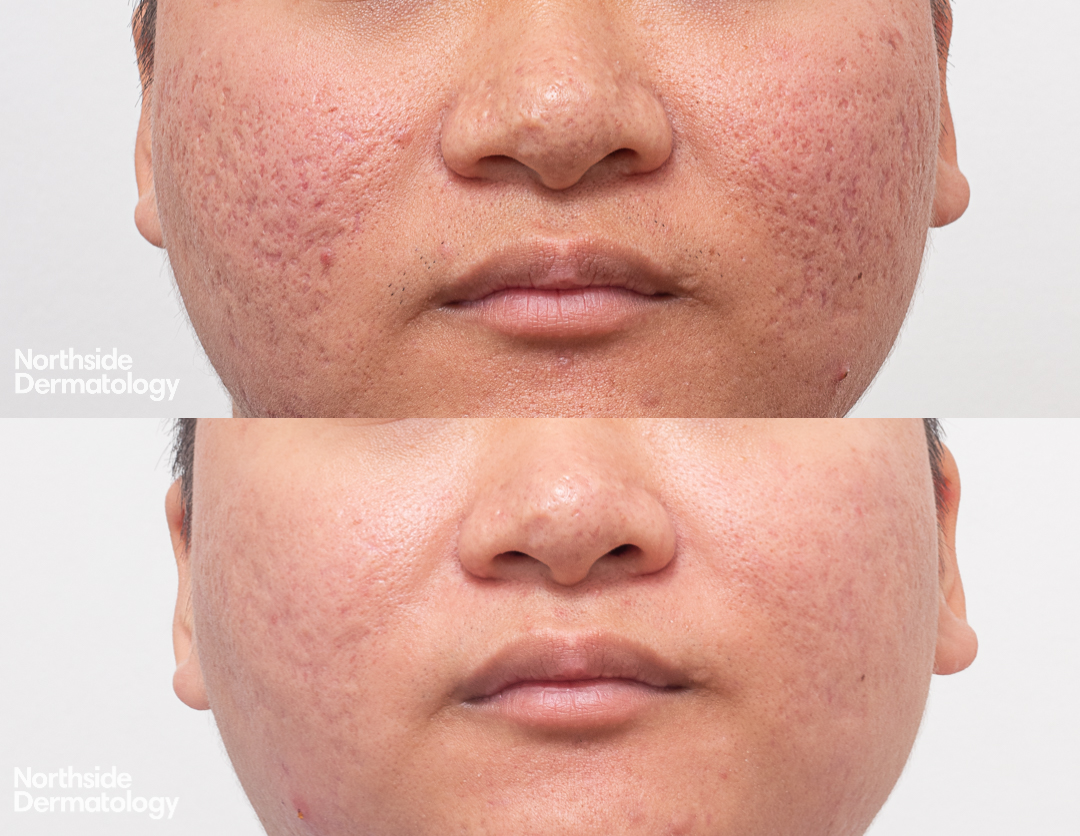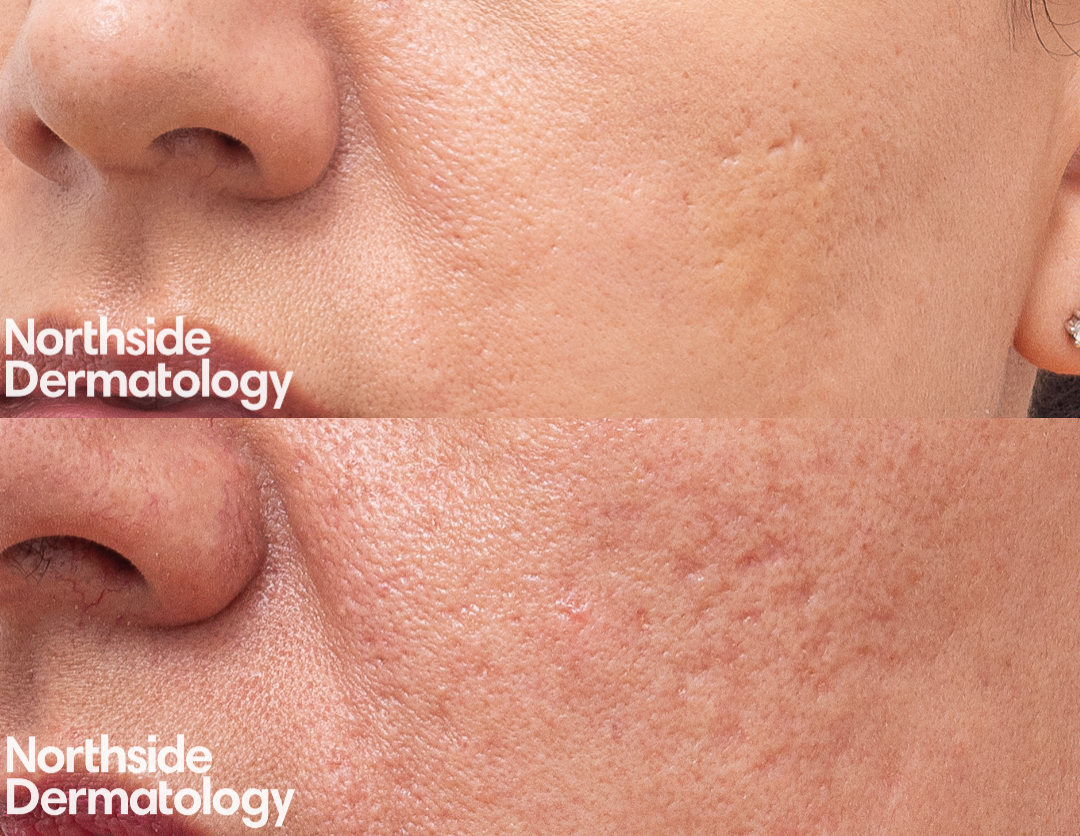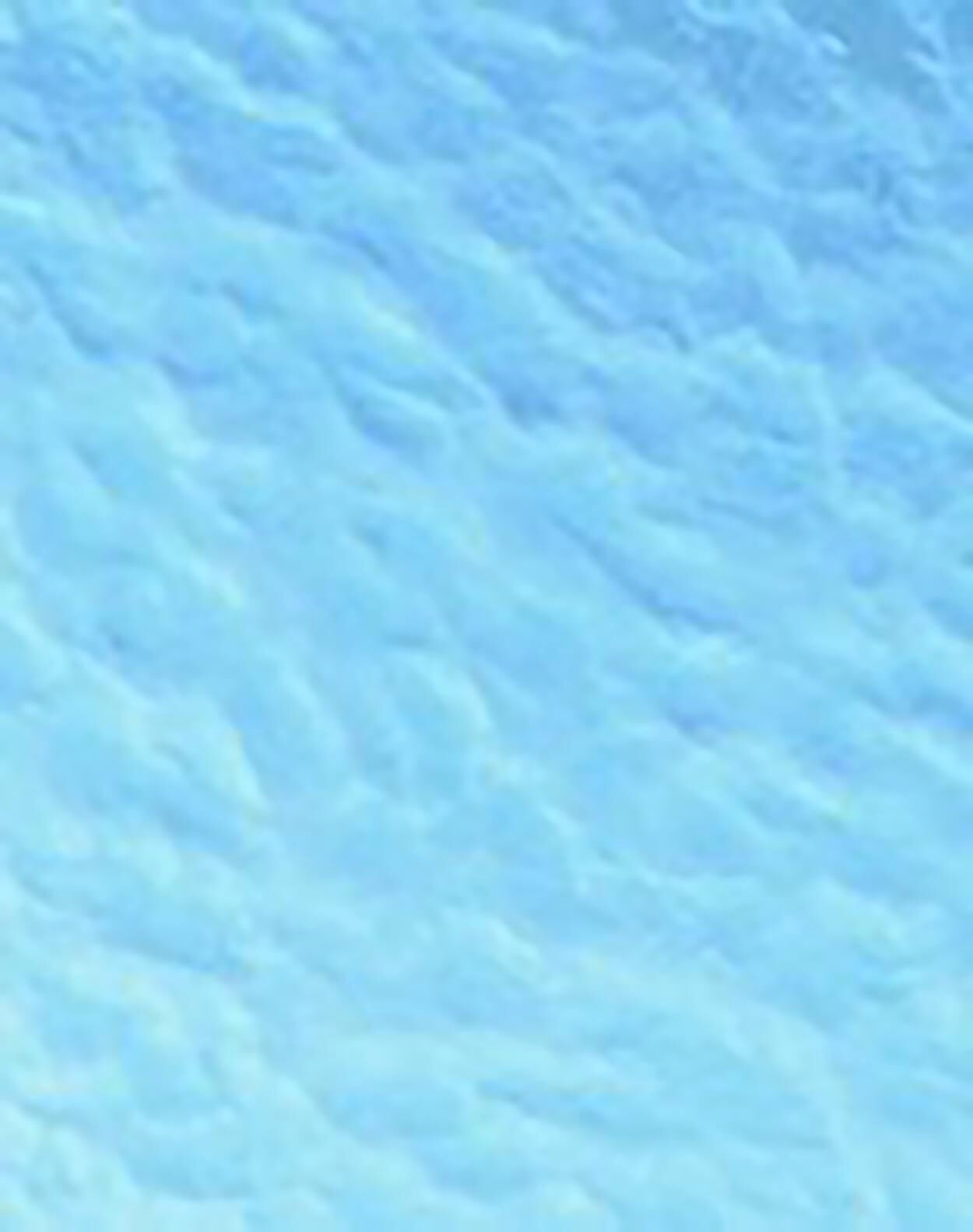
Acne Scars
Acne scars are created when a breakout penetrates the skin deeply and damages the underlying tissues. The body responds to this damage by engaging its natural healing mechanism and producing collagen to rebuild the affected tissue. However, it is not a perfect system. If the body produces too much collagen or too little collagen, a scar forms. This scar remains after the acne itself has cleared.
Acne scars can be stubborn, but there are many treatments available to improve their appearance. In the vast majority of cases, it is necessary to use a combination of treatment modalities to completely address a patient’s scarring. Tailoring the treatment to the individual is essential to achieve the best outcome. Contact Northside Dermatology to schedule an appointment with a specialist dermatologist.
B and A after 2 sessions of co2 laser resurfacing and subcision
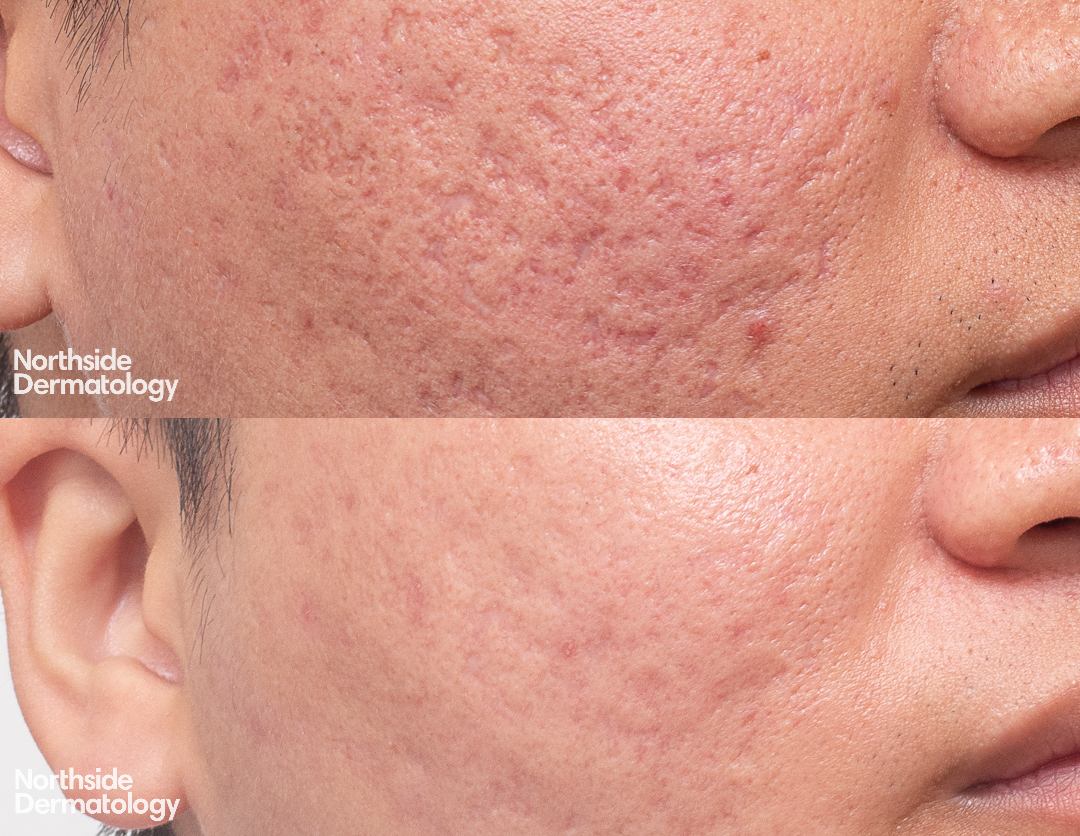
What Are the Different Types of Acne Scars?
Acne scars fall into two broad categories. Depressed scars create a pit or dent in the skin. Raised scars project upward from the skin’s surface. Within those categories, there are several common types of acne scars:
- Ice Pick Scars: deep, narrow, pitted scars. These are best treated with TCA CROSS, punch excision or Co2 laser.
- Boxcar Scars: broad depressions with sharply defined edges. These are suitable for TCA CROSS, punch elevation, Co2 laser and dermal fillers.
- Atrophic and Rolling Scars: broad depressions with gently sloping edges. These are treated wtih subcision, nanofractional resurfacing RF, fractional co2 laser and dermal fillers.
- Hypertrophic Scars: thick, raised, lumpy scars. These scars are treated with intralesional injections (steroid and nerve-ending blockers) and sometimes vascular +/- resurfacing laser +/- laser-assisted medication delivery.
- Red slightly depressed scars can be treated with vascular laser or nanofractional RF.
- Pigmented scars can be treated with peels, pigment-inhibiting creams, Q-switched laser and superficial resurfacing laser.
- Hypopigmented scars: scars that are white and lack in pigmentation. These tend to be challenging to treat. We use resurfacing laser in combination with pigment stimulating medication.
What Is TCA CROSS Treatment For Acne Scarring?
TCA CROSS stands for ‘TriChloroacetic Acid Chemical Reconstruction Of Skin Scars’. During the procedure, a specialist dermatologist applies a small amount of high-concentration TCA directly to the scar. A chemical reaction occurs, causing a localised inflammatory response that leads to the formation of new collagen fibres that change the appearance of the scar. The treated areas initially turn white, then become red and undergo a crusting phase. Recovery is expected within three to seven days. The collagen formation process continues gradually over the course of multiple TCA CROSS treatments until a good result is achieved. TCA CROSS is ideal for treating deep ice pick scars.
B and A after 3 session of TCA CROSS and skin resurfacing with RF and 1 session of low density CO2 laser resurfacing
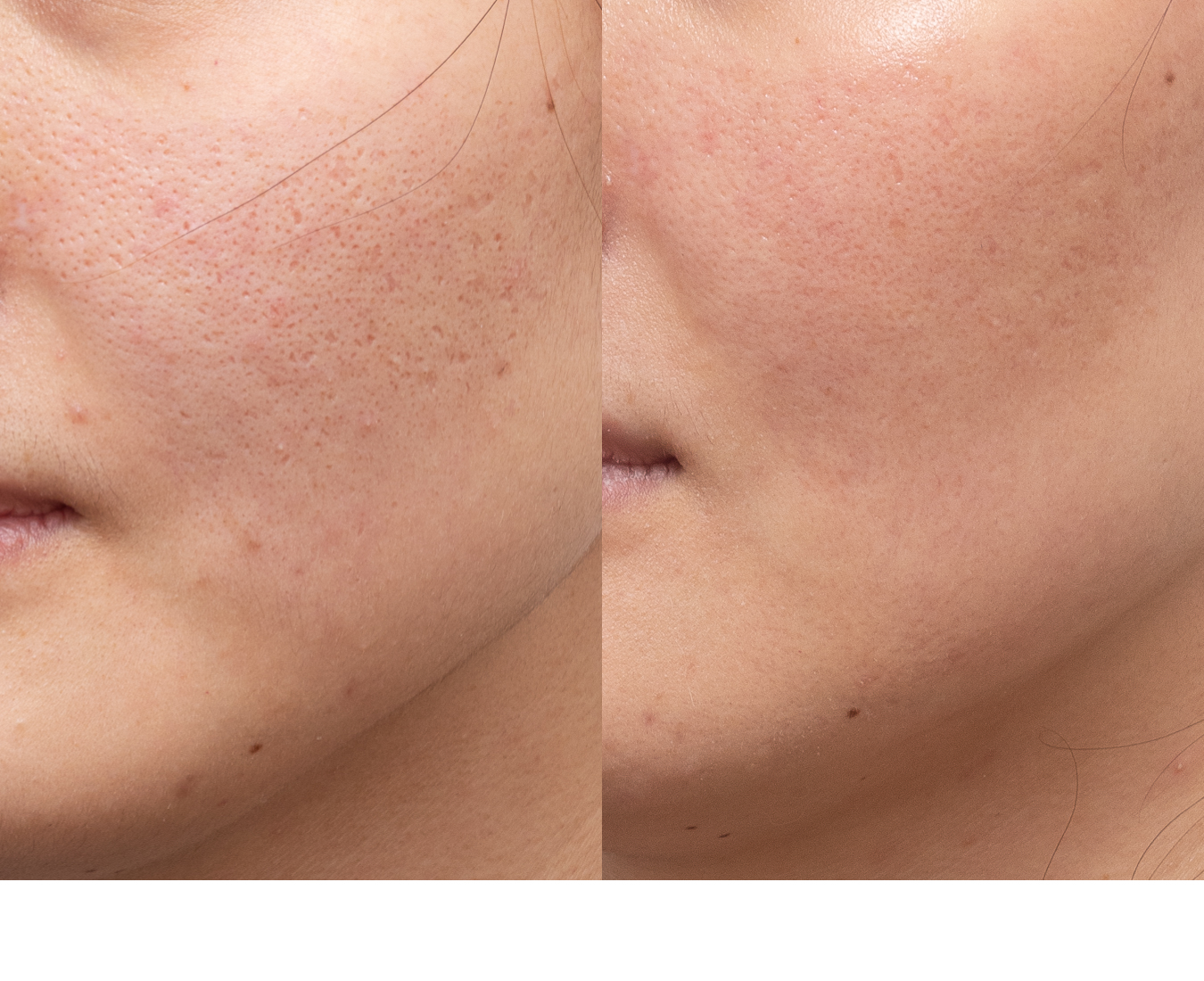
What Is Subcision Treatment For Acne Scarring?
Subcision is a surgical technique used to treat depressed acne scars. A specialist dermatologist performs the procedure by inserting a special needle into the skin and using it to separate the thickened scar tissue from the underlying tissue. This allows the skin to return to its normal position and stimulates collagen growth, leading to cosmetic improvement of the scar. Subcision is a minor procedure that can be safely performed in an outpatient setting under local anaesthetic . Most established, advanced acne scars can benefit from this underutilised technique.
What Other Treatment Options Are Available for Acne Scarring?
TCA CROSS and subcision are just two of many modalities available to treat acne scarring. Other options include:
- Radiofrequency Treatment: an energy-based device associated with little downtime that stimulates collagen remodelling to treat rolling scars; suitable for both light and dark skin types
- Laser Resurfacing: treatment with fractional CO2 laser and or 1927nm thulium laser that removes damaged cells and stimulates collagen production; used for more advanced scarring
- Punch Elevation: a procedure in which the scar is lifted to match the surface level of the skin, making it less noticeable; best for boxcar scars with sharp edges
- Punch Excision: a minimally invasive technique that excises the scar using a small punch tool; ideal for deep ice pick scars and narrow, deep boxcar scars
- Intralesional Injections: an intralesional steroid or 5-fluorouracil injection administered directly into a hypertrophic scar to break down excess collagen and prevent further collagen growth
- Laser Genesis: a non-ablative laser that delivers short pulses of laser energy to promote collagen production and reduce redness; recommended for red atrophic scars
- Vascular Laser: a laser that improves red marks left behind by old acne lesions; recommended for predominantly red scars
- Pigment Laser: a laser that specifically targets post inflammatory pigmentation that is left by acne.
- Dermal Fillers: dermal fillers can be injected into the scarred area to fill in an indented scar and create a smoother surface; recommended for persistent depressed scars
- Skin Needling: a gentle, lower cost treatment that stimulates the body’s natural healing and collagen production processes by using ultrafine needles to create tiny wounds in the skin; effective for subtle scars and scars in the early stages of development
- Prescription Topical Cream: topical prescription treatments that can improve acne scarring include retinoids (derived from vitamin A), pigment lightening cream and steroid cream
- Silicone Gels: application of medical-grade silicone products can help flatten and soften raised scars by increasing hydration and regulating collagen synthesis
- Sun Protection: fresh scar tissue is delicate and vulnerable to a condition called post-inflammatory hyperpigmentation; use sunscreen and protective clothing to keep new scars shielded from UV exposure.
B and A photos 6 weeks after one session of co2 laser resurfacing for acne scarring
I Have a Busy Schedule. What Kind of Low Downtime Acne Scar Treatment Can I Have?
For effective acne scar treatment with minimal downtime, we recommend radio frequency treatment, Laser Genesis, vascular laser, or skin needling. Each of these treatments involves minimal downtime and simple postprocedure care. Side effects from these treatments are typically mild and resolve relatively quickly, allowing you to return to your regular routine as soon as possible.
I Had Laser Acne Scar Treatment at Another Clinic. Why Didn’t it Work?
Laser treatments are not right for every patient or every scar. It’s critical to undergo assessment by a professional to determine the best option for your circumstances. Your treatment must be tailored to your individual scars, and different scars may require different approaches. Your specialist dermatologist may recommend subcision for one scar and TCA CROSS for another, followed by radiofrequency treatment and dermal fillers to achieve optimal results. Every scar is different.
What Is the Best Way to Treat Acne Scars?
The first step to treating acne scars is to be examined by a specialist dermatologist with extensive experience in scar identification and management. They will assess your skin to determine what types of acne scars you have, the severity of your scarring and the best course of treatment for each scar type. Most people have a combination of types that require a blend of treatment modalities over a period of time to achieve the best possible result.
Northside Dermatology is a leading provider of acne scar treatments in North Fitzroy and Reservoir. Dr Liu, the principal dermatologists, perform a wide range of treatments to diminish acne scarring and help patients achieve clear, even complexions. Book an examination and receive a personlised acne scar treatment plan at Northside Dermatology by calling us on 03 8582 8688.
Contact Us
Hours of Operation
Monday - Friday, 9am-5pm
Phone Number
Fax Number
Emails
Medical Enquiries:
reception@northsidedermatology.com.auLaser & Cosmetic Enquiries:
cosmetic@northsidedermatology.com.au
